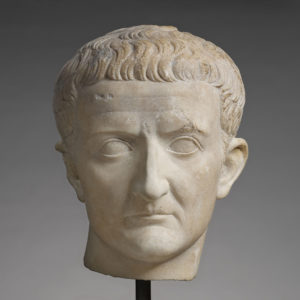Tacitus describes Tiberius in the Annals

Portrait Head of Tiberius, “The Lansdowne Tiberius,” early 1st century, Marble. 29.2 × 21 × 22.2 cm (11 1/2 × 8 1/4 × 8 3/4 in.). The J. Paul Getty Museum, Los Angeles
The great Roman historian Tacitus (c. 56 – c. 120 CE) wrote about the Emperor Tiberius (42 BCE – 37 CE) in his book Annales ab excessu divi Augusti which is one of the most important and authoritative primary historical sources of its time.
The full title means “Annals of the Excesses of the Augustan Gods” and as the title shows, Tacitus was skeptical of the motives and personal style of Tiberius. This can be seen in this short excerpt below, where he describes the first speech Tiberius gave to the Senate after the death of Augustus.
Compare this account written by Tacitus to the one written by Suetonius in The Lives of the Caesars, which describes the same moment.
Here is Tacitus’ text in English, Latin, Spanish and Italian. (I will add French once I find the text.) I think it is interesting to compare the Latin to the other modern languages. Whether you know any of those languages as a native speaker or a student, short comparisons like this can provide interesting insight into Latin and the other languages and may open doors to future study.
Tacitus, Annals, Book I, the first part of Chapter XI (English)
Then all prayers were directed towards Tiberius; who delivered a variety of reflections on the greatness of the empire and his own diffidence:
“Only the mind of the deified Augustus was equal to such a burden: he himself had found, when called by the sovereign to share his anxieties, how arduous, how dependent upon fortune, was the task of ruling a world! He thought, then, that, in a state which had the support of so many eminent men, they ought not to devolve the entire duties on any one person; the business of government would be more easily carried out by the joint efforts of several men.”
There was more affectation than good faith in his speech. Besides, the diction of Tiberius, by habit or by nature, was always indirect and obscure, even when he had no wish to conceal his thought; and now, in the effort to bury every trace of his sentiments, it became more intricate, uncertain, and equivocal than ever.
(From the Loeb Classical Library edition of Tacitus, 1931. The text is in the public domain, per this page http://penelope.uchicago.edu/Thayer/E/Roman/Texts/Tacitus/Annals/1A*.html)
Tacitus, Annals, Book I, the first part of Chapter XI (Latin)
Versae inde ad Tiberium preces. et ille varie disserebat de magnitudine imperii sua modestia.
solam divi Augusti mentem tantae molis capacem: se in partem curarum ab illo vocatum. experiendo didicisse quam arduum, quam subiectum fortunae regendi cuncta onus. proinde in civitate tot inlustribus viris subnixa non ad unum omnia deferrent: plures facilius munia rei publicae sociatis laboribus exsecuturos.
plus in oratione tali dignitatis quam fidei erat; Tiberioque etiam in rebus quas non occuleret, seu natura sive adsuetudine, suspensa semper et obscura verba: tunc vero nitenti ut sensus suos penitus abderet, in incertum et ambiguum magis implicabantur.
(Annales ab excessu divi Augusti. Cornelius Tacitus. Charles Dennis Fisher, ed. Clarendon Press. Oxford. 1906. This work is licensed under a Creative Commons Attribution-ShareAlike 3.0 United States License.)
Tacitus, Annals, Book I, the first part of Chapter XI (en Español)
Hechas, pues, las exequias de Augusto en la forma acostumbrada, se le decretaron el templo y los honores celestes como a uno de los dioses. Vueltos después a Tiberio los ruegos de todos, comenzó a discurrir con fingida modestia de su poco caudal y de la grandeza del Imperio, afirmando que…
…sólo Augusto era capaz de tanto peso; de quien, metido en la parte de los cuidados, había aprendido con la experiencia cuán arduo y sujeto a la fortuna era el gobernarlo todo; a cuya causa les pedía que, en una ciudad sostenida de tantos varones ilustres, no quisiesen echar toda la carga sobre los hombros de uno solo; siendo cierto que muchos unidos al trabajo suplirían mejor a las necesidades de la República.
Pero fue este lenguaje más de ostentación que de crédito; y en Tiberio, acostumbrado aun sin necesidad, por naturaleza o por uso, a decir siempre palabras ambiguas y oscuras, entonces que lo procuraba con artificio eran tanto más inciertas y escondidas.
(This Spanish translation by Carlos Coloma published in 1866 is in the public domain. Source: https://www.dropbox.com/s/oaz5msuznciflz6/Tácito.pdf?dl=0)
Tacitus, Annals, Book I, the first part of Chapter XI (in Italiano)
Le preghiere furono quindi rivolte a Tiberio. Ma lui si dilungava sulla grandezza dell’impero e sulla propria modestia.
“Solo la mente del divo Augusto, spiegava, poteva sostenere tanta mole; quanto a sé, chiamato da Augusto a una parte delle responsabilità, aveva, con l’esperienza, appreso quanto arduo e quanto soggetto ai capricci della sorte fosse il grave compito di reggere tutto. Non dovevano perciò, in uno stato che poteva contare su tanti uomini illustri, trasferire tutto il potere nelle mani di uno solo: più persone, uniti i loro sforzi, avrebbero meglio assolto alle responsabilità della repubblica.”
In tale discorso c’era più decoro formale che sincerità. A Tiberio, anche là dove nulla intendeva nascondere, sia per natura sia per abitudine, era sempre evasivo e oscuro nelle sue parole; in quell’occasione poi, nello sforzo di dissimulare il suo vero sentire, tanto più si avviluppavano in un equivoco intrico di ambiguità.
The Portrait Head of Tiberius source page on the Getty website, which gives permission to use the image:
http://www.getty.edu/art/collection/objects/6731/unknown-maker-portrait-head-of-tiberius-the-lansdowne-tiberius-roman-early-1st-century/
